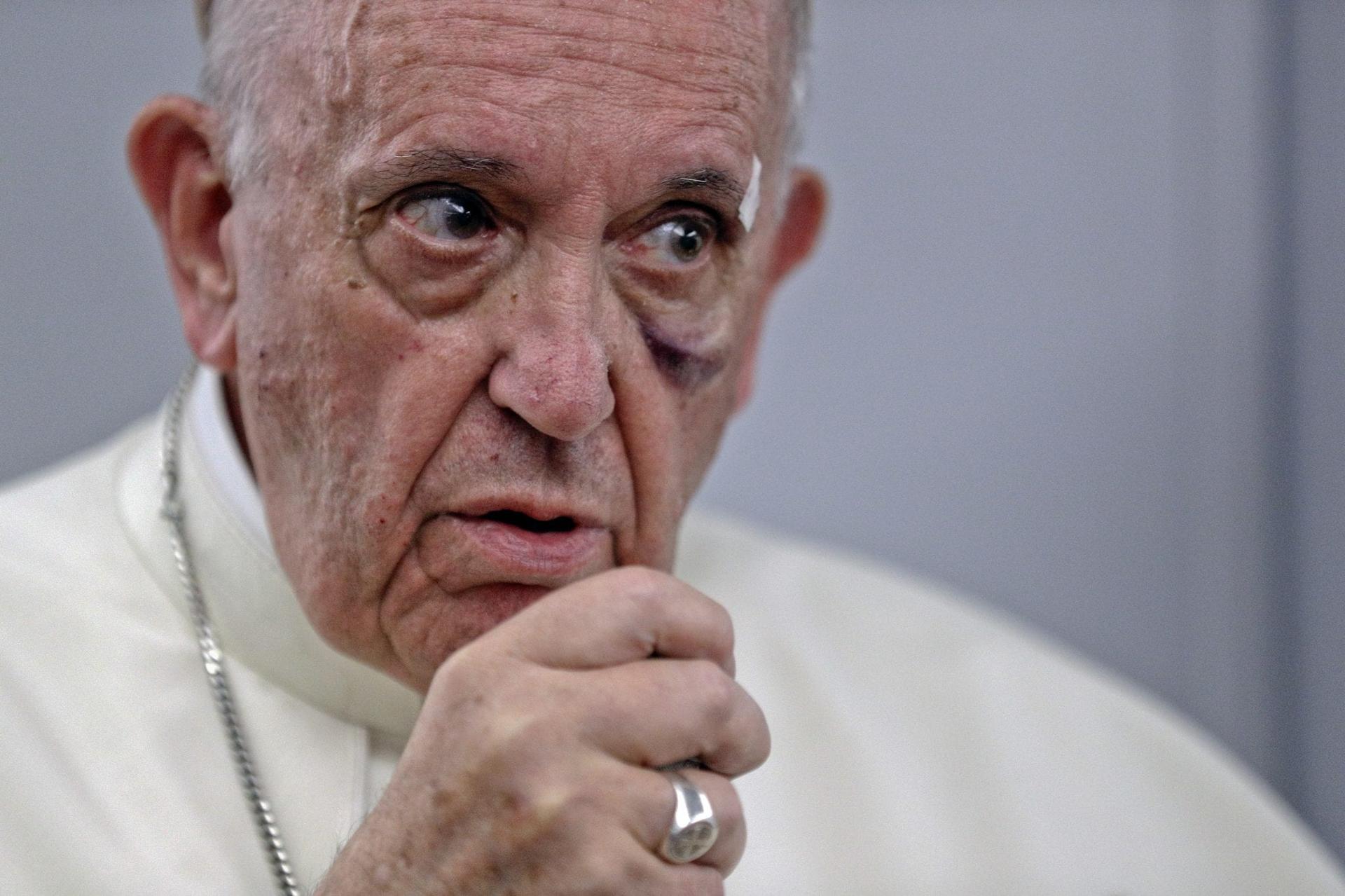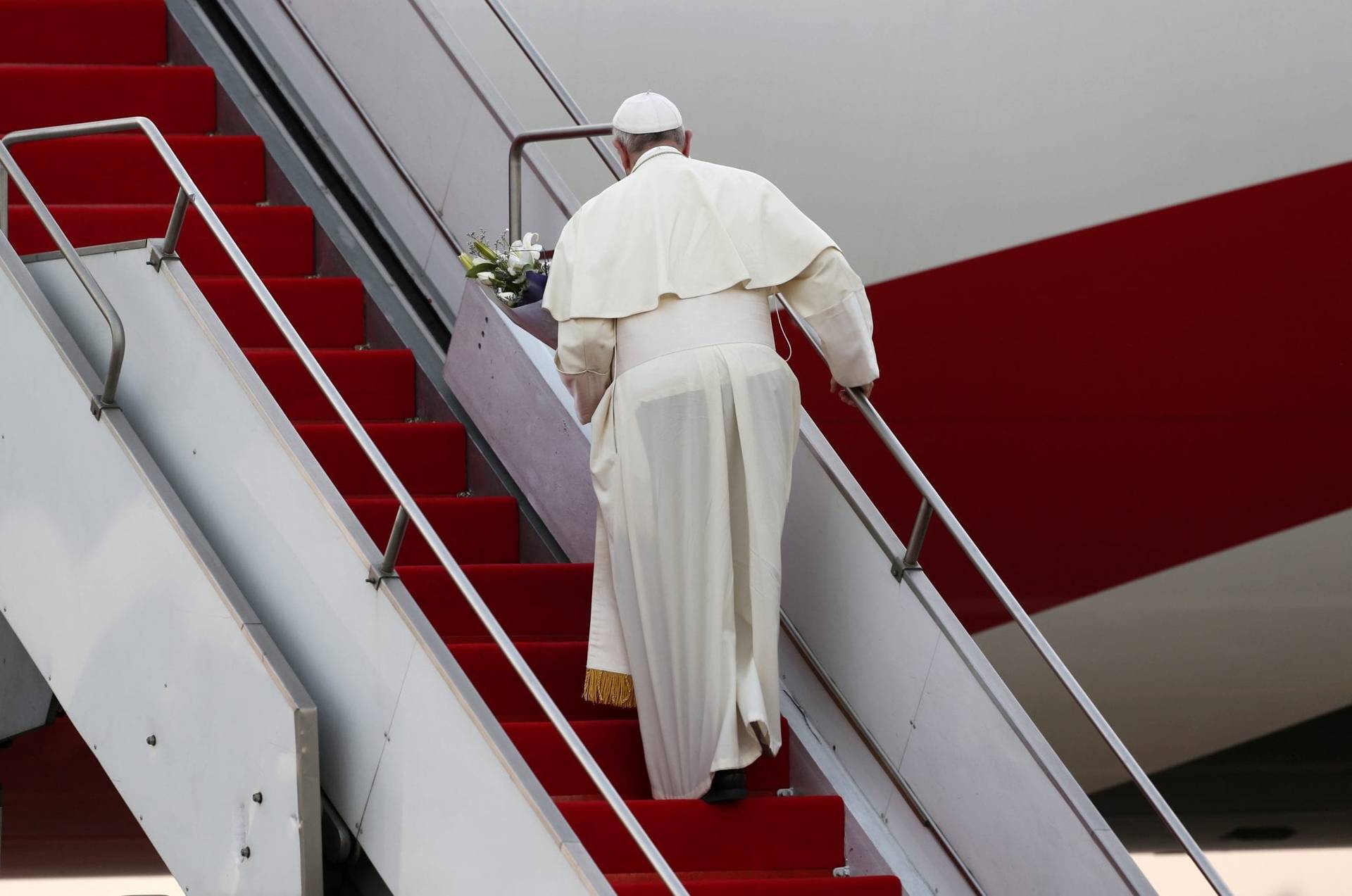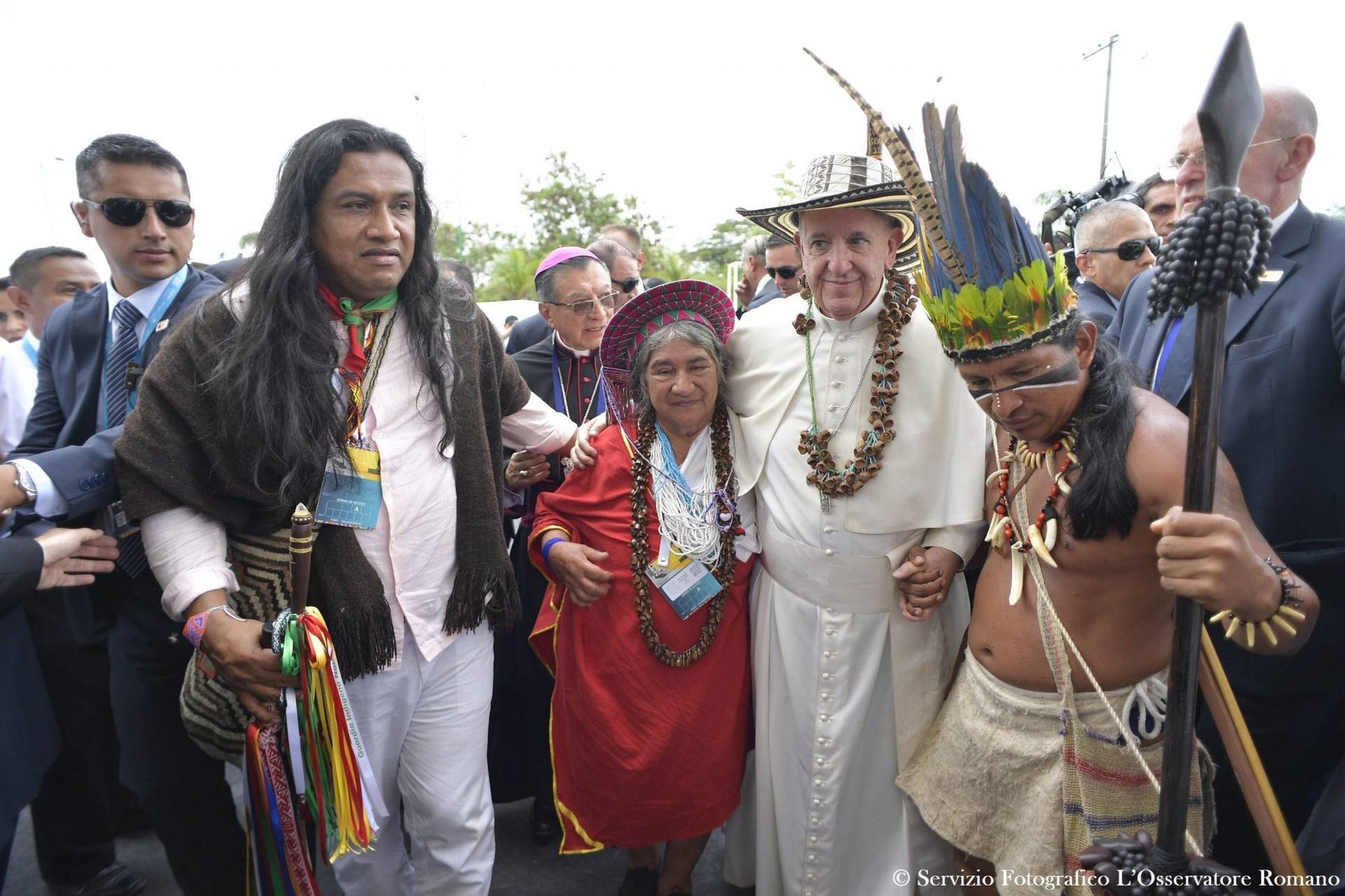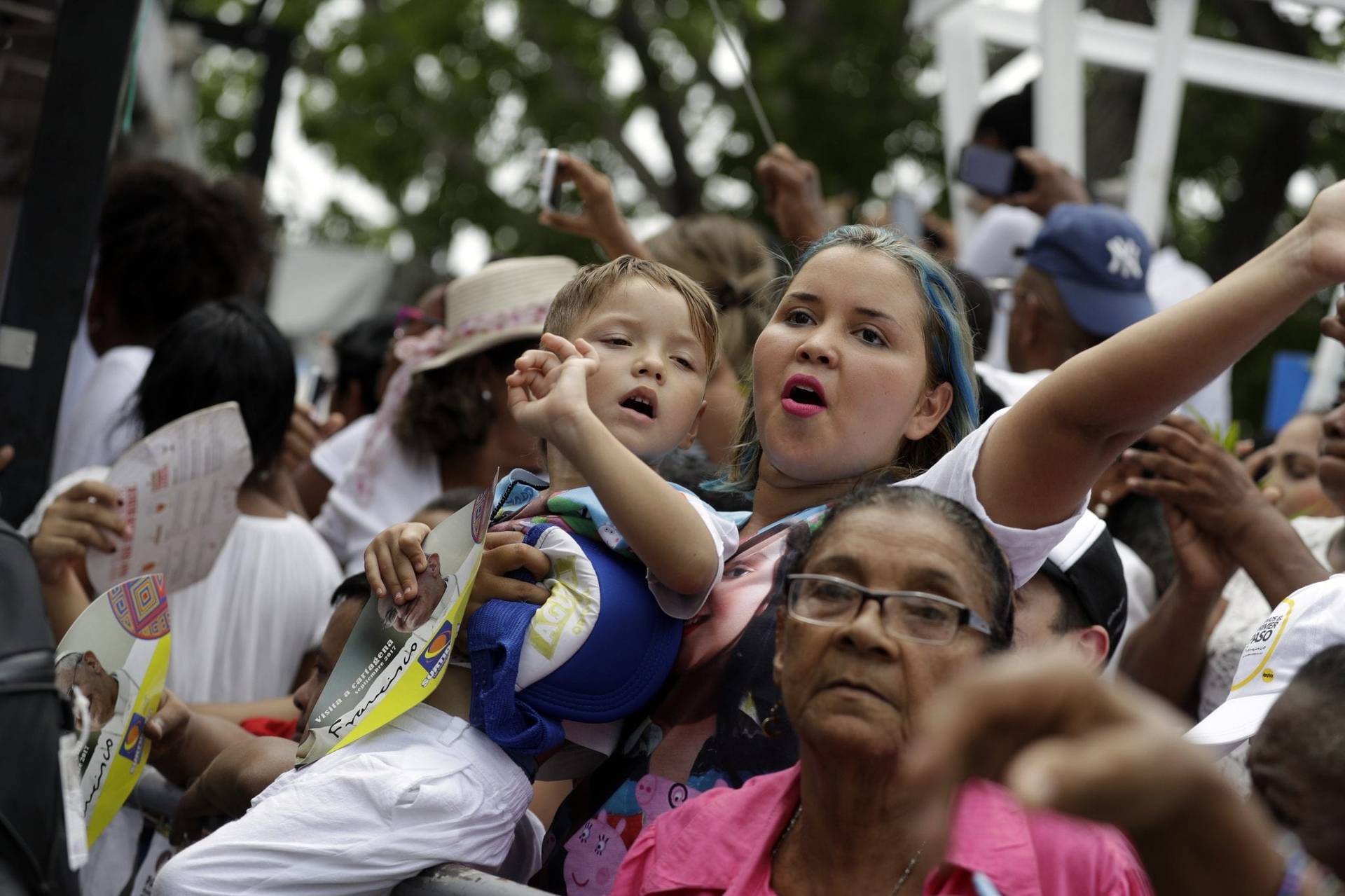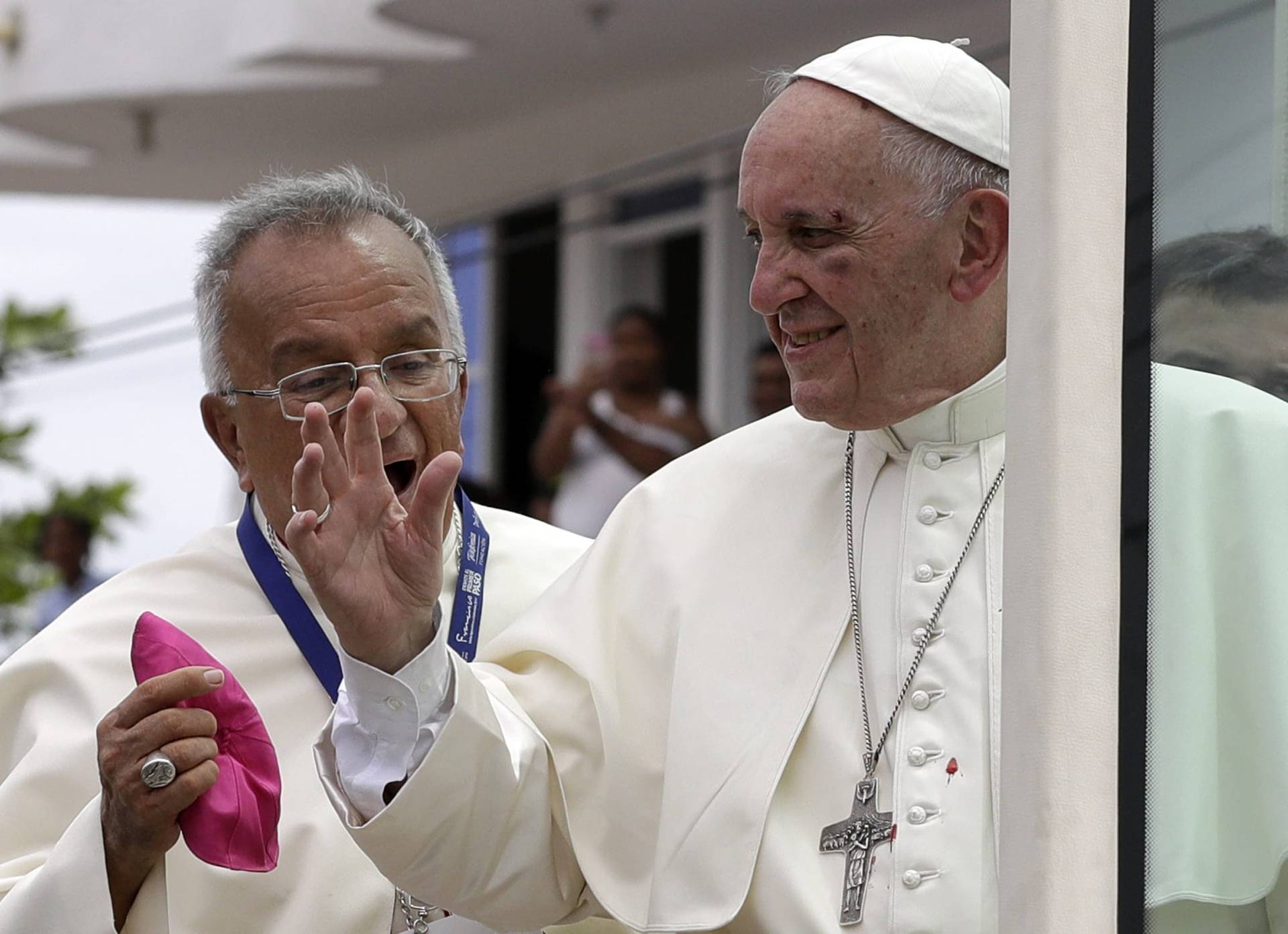ABOARD THE PAPAL PLANE – Pope Francis on Monday said those who support the separation of families through restrictive immigration laws cannot describe themselves as “pro-life.”
After acknowledging that he hasn’t read the fine print of a recent measure by President Donald Trump canceling the Deferred Action for Childhood Arrivals program, which allowed immigrants brought into the United States as minors to remain, Francis also said he hopes the Trump administration “rethinks” the decision that puts on hold the futures of an estimated 800,000 young people.
“I believe that this law comes, I think, not from Congress but from the executive branch of the government,” he said. “If it is so, I have the hope that it’s re-thought, because I heard the president of the United States introduce himself as a ‘pro-life’ man.
“A good pro-lifer,” Francis said, “understands that family is the cradle of life, and that its unity must be defended.”
As Hurricane Irma continues to bear down on Florida in the United States, the pontiff also had some sharp words for climate change skeptics, saying that anyone who doubts it’s real should “speak to a scientist.”
Pope Francis’s words came during a press conference he gave on a flight back to Rome from his Sept. 6-11 visit to Colombia. Due to turbulence related to Hurricane Irma, despite the more than 10-hour transatlantic flight, the pope spoke only for some 30 minutes.
Among other things, Francis also said that:
- It’s unacceptable that developed countries see Africa largely as a place to be exploited for its resources, whether human or natural.
- He would like to see the United Nations intervene in the Venezuelan crisis.
- When it comes to the situation with North Korea, he “doesn’t understand” the world of geopolitics. “For what I see, there’s a fight of interests that is beyond my understanding, I don’t get it.”
- Corrupt people are incapable of asking for forgiveness, making it hard to help them, but God can do so.
Trump and dreamers
Francis was asked about Trump’s decision to cancel DACA by Spanish-speaking journalists. He said that he hasn’t had time to read the decision in full, nor articles written about it.
As it stands, the president announced his decision to cancel the program and asked Congress to come up with a different one, allegedly because he doesn’t want to deport young immigrants who arrived in the United States when they were minors and were given a visa to stay in the country either to study or work.
However, Francis said that separating young people from their families is not fruitful, and that supporting the division of families is in contradiction with the term “pro-life” because family is the cradle of life.
“But I don’t want to talk about the law, because I haven’t read it and I don’t like to talk about that which I don’t know,” he said.
The pope also said that young people have to recover hope, and that being “rootless” takes hope away from them. Not having roots, Francis said, leads young people toward addictions and even suicide.
“It’s for this reason that I insist on dialogue between young people and the elderly, because that’s where their roots are,” he told reporters.
The exploitation of Africa
Italian journalists asked the pontiff about migration to Europe, particularly about a recent decision by the Italian government of trying to reduce the influx of migrants departing Libya for Europe. The African nation has become the gate of exit for those fleeing hunger and conflict in the continent for Europe, with most arriving in Italy, Greece, and, to a lesser extent Spain.
Francis began responding by thanking Greece and Italy for “opening their hearts to migrants.”
However, he said, it’s not enough to have an open heart, which must always be the case because of God’s commandment to welcome, “because you were a slave, a migrant in Egypt.”
A government, the pope continued, must address this issue with the virtue due to a political leader: “prudence.” Meaning, they must evaluate how many people they can welcome. Then, they must do so, trying to integrate them into society.
The third issue to consider on the migrant crisis is that there’s a “humanitarian problem,” which he witnessed through the photographs of, for instance, the inhuman situation of migrants fleeing through the dessert.
Francis then denounced the fact that there’s a principle in the “collective unconsciousness: Africa is [to be] exploited.”
A head of state, the pope continued, once rightly said that it’s necessary to help those fleeing from hunger, investing in the countries of origin so that they grow. However, when “developed countries go to Africa it is to exploit it. Africa, friend, must be helped to grow.”
When migrants flee war, he acknowledged, it’s a different matter.
Venezuela, and the appeal to the United Nations
French-speaking journalists asked the pope about Venezuela, questioning if perhaps the time has arrived for him to take a stronger stance on the crisis. They also observed that President Nicolas Maduro has criticized the local bishops’ strong position against his government, but defended Francis, claiming the pope is on his side.
Francis said that he believes the Holy See has spoken very clearly, and that it’s up to Maduro to explain what he means.
“I don’t know what is in his mind,” he said.
The Vatican, the pope insisted, has done much, from sending a papal representative to a dialogue attempt made last year by four former presidents to him making several public appeals after the Sunday Angelus prayer.
“It seems that the situation is very difficult,” he said. “The most painful thing is the humanitarian problem. So many people who are escaping or suffering. There’s a humanitarian problem that we have to help respond to. I believe the United Nations should make itself felt to help.”
This is the fifth time throughout the Colombia trip that Francis referenced Venezuela. He did so twice during the flight there, sent out a statement by meeting with five Venezuelan bishops after a Mass in Bogotá, and then on Sunday, after the traditional Angelus prayer, asked for prayers for “the beloved Venezuela.”
Corrupt people
Colombian journalists asked Francis about corruption, saying that it’s always been present in the country, but the end of a 54-year old conflict has made it more evident, since the media has shifted its focus towards it. Asked if corrupt people should be excommunicated, the pontiff said this was a question he’s asked himself many times.
“We’re all sinners, and we know that the Lord is close to us and that he doesn’t tire of forgiving,” he said. “A corrupt person tires of asking for forgiveness and forgets how to do so.”
This, the pontiff added, is a grave problem, which shows the insensitivity in front of pain and in front of the exploitation of a person.
“[A corrupt person] is incapable of asking for forgiveness. It’s very hard to help a corrupt person, but God can do so. I pray for them,” he said.
Climate change, and “man is stupid”
Both English and Italian-speaking journalists asked the pope about climate change.
The first group, noting the three almost parallel hurricanes that affected the United States in recent weeks, which some scientists say is the result of rising temperatures of oceans, asked about the moral responsibility political leaders have to work with other nations to reduce climate change.
“Those who deny climate change need to go to scientists and ask them,” Francis said. “They are clear and precise.”
Scientists, the pope said, have clearly stated what the path to follow is: “Each [person] has a moral responsibility, bigger or smaller.”
Climate change, he added, is a “serious matter over which we cannot make jokes.”
According to Francis, each person has to form their opinion on the matter and decide how to act. “History will judge the decisions,” he said.
“A university, I don’t remember which one, said we only have three years to reverse course or the consequences will be terrible,” Francis said. “I don’t know if three years is true or not, but if we don’t go back we will go down, that is true.”
Italians, instead, asked about why some are taking so long to become conscious of the impact of climate change. To this, the pope answered with an old saying from the Psalms: “Man is a stupid and hard-headed being who doesn’t see.”
Man, he insisted, is the only created animal who trips twice with the same stone (though he technically said, “puts the leg in the same hole.”)
How are you?
Journalists also asked the pope about how he’s doing after the small accident he had on Sunday, while riding the Popemobile in Cartagena.
“It was only a moment, I reached out to try to greet the children, didn’t see the glass and ‘boom.’”
One of the funniest moments of the presser came when he was talking about this incident, referring to his injury using an Argentine expression that Spanish-speakers from other countries travelling on the plane didn’t understand: “I have the eye in compote,” would be the literal translation, meaning he has a black eye.
